Text
A Bounty of Links
Oliver Burkeman -- The Truth about Planning Your Life - "When else can you cross a bridge, except when you come to it?"
Also, Burkeman tries Zettlekasten and learns his lesson https://ckarchive.com/b/5quvh7h6ke25
On Being interviews Buddhist Stephen Batchelor on "Finding Ease in Aloneness" and the silliness of trying to find perfection in a human life.
The Frustration with Productivity Culture- Cal Newport - in which Newport recognizes that people think productivity culture is bunk but then entirely misses the point.
Alan Jacobs critiques the Newport article.
2 notes
·
View notes
Quote
Abundance is not a technological threshold, but a social relationship.
Aaron Benanav
3 notes
·
View notes
Text
A Bounty of Links
How to slow down the experience of time - from Alice Lemee's newsletter Internetly
Hundreds of Ways to Get S#!+ Done—and We Still Don’t - guys who run a to-do list app actually look at the data to see if people are completing their to-dos. I am not sure I've seen any data on this before, just anecdotes.
Ian Bogost in 2013 on "Hyperemployment" - "a sense of inundation, of being trounced by demands whose completion yields only their continuance, and a feeling of resignation that any other scenario is likely or even possible."
🤦♂️ A new type of guy...
tfw you need an app to remind you of your core principles.
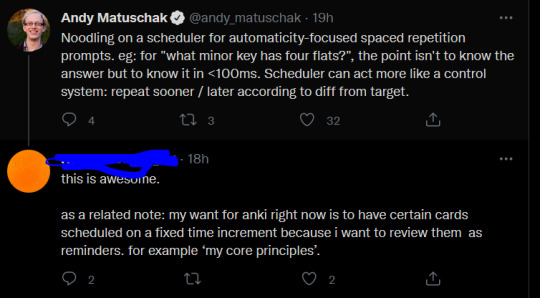
3 notes
·
View notes
Text
Thoreau went a-berrying
In late August, Thoreau would go a-berrying. Sometimes his journals show just a few lines about whether he went with the Emersons or alone and notes about the weather. His entry for August 28th, age 39, is more substantial. He went alone to gather some cranberries, Vaccinium oxycoccus. Vaccinium oxycoccus is a smaller species than the cranberries commonly harvested in New England, the Vaccinium macrocarpon. Thoreau had found this petite strain growing wild in nearby Gowing’s Swamp, and he had the the bog all to himself because the small size of the patch meant they were not profitable to sell. No one else could muster interest in these berries when the other berries in the region provided more sustenance, both directly as food and indirectly as a commodity. Thus Thoreau found himself alone, knee deep in bog, tasting berries and, as Thoreau does, contemplating life.
He hesitated about making the trip out to the bog, a hesitancy that is at odds with our vision of Thoreau as a constantly solitary, hill-traipsing individual. “I could hardly make up my mind to come this way, it seemed so poor an object to spend the afternoon on.” Out he went anyway, expecting this to be his last opportunity before the frost took the choice away from him. His choice to go is slightly perverse--the fact that a walk through a bog seems invaluable, he thinks, means that it will instead be rewarding. He says it passed his mind that because he had low expectations “it would turn out well, as also the advantage of having some purpose, however small, to be accomplished [...] I have always reaped unexpected and incalculable advantages from carrying out at last, however tardily, any little enterprise which my genius suggested to me long ago as a thing to be done,--some step to be taken, however slight, out of the usual course.”
Repeatedly in this journal entry he insists that this trip to the bog has value, but the effort he puts into convincing himself shows his internal struggle. His delight in the bog is tempered with bitterness. He is bitter about the owner who has dismissed the value of the bog, and the townspeople as a whole for not appreciating it as he does. Then there is bitterness about how all value is reduced to commerce. An editor’s note in my NRYB Classics edition points out a deliberate slight on Hawthrone who was serving as a US Consulate in England at the time: “Better for me, says my genius, to go cranberrying this afternoon for the Vaccinium oxycoccus in Gowing’s Swamp to get but a pocketful and learn its peculiar flavor, aye, and the flavor of Gowing’s Swamp and of life in New England, than to go consul to Liverpool and get I don’t know how many thousand dollars for it, with no such flavor.” He also mentions how one might instead be “setting up your neighbor’s stove, and be paid for it,” another example that seems to be an arrow shot at a known target. Thoreau knows in his heart that going out and tasting a berry has value, but his brain is full of examples of that show that society thinks otherwise, and he has to argue with these examples one by one. He needs to reassure himself that things can have value even if no one recognizes it, and indeed, even more so because no one else recognizes it. “If you would really take a position outside the street and daily life of men,” she says, “you must have business which is not your neighbors’ business, which they cannot understand.”
There is a tautology at the heart of all productivity culture. Productivity culture tries to prove that life has value by cramming it full of activities that have value. We in turn prove those activities have value by allocating them some of our precious time. We use the systems themselves as justification for our lives, and the need to give our lives meaning as justification for the systems. Thoreau worried as much as anyone about if his life had meaning and if his activities had value, but he learned to put his faith in the external world. He trusted that if he were attentive to the world, he would find things of value there. If he chose to open himself up to the world by rebuking the expectations of man, his experiences would be of value if for no other reason than their rareness.
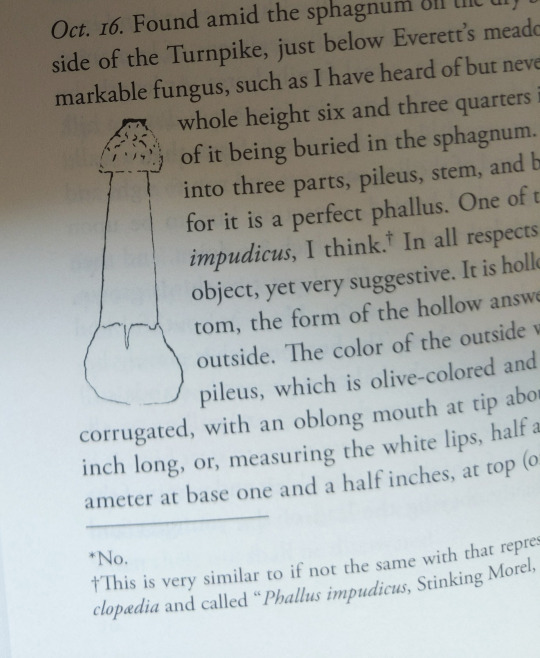
2 notes
·
View notes
Text
Reclaim review
Time blocking is a comparatively new time management trend that throws away the idea of the infinite to-do list in exchange for scheduling each chunk of your day. The principle is that by scheduling tasks in advance, you are making decisions about what you really want to use your time to do and getting rid of the illusion that you can ultimately get to it all. I have always liked the idea in theory, but there are some inconveniences that mean it has never worked for me in practice. First of all, for it to work, I would have to constantly be looking at my calendar. Then there’s the problem that I inevitably need to reschedule something, and I have to shift things around until I’m erasing holes through my planner. There’s also the problem of other people: I need to leave time on your calendar for work meetings or friend hangs, and that means deviating from my ideal schedule to meet others halfway. Like many time management ideas, the concept is good, but the implementation is tricky.
Reclaim is a new (2020) app that syncs your calendars and helps manage those shifting time blocks for you. I gave it a try since it’s currently free. Reclaim syncs your google calendar (no Outlook as of yet) and then allows you to give it a list of tasks or habits to schedule. For instance, I told it I needed to send birthday cards to my friends. I told them that each card would take 15 minutes, and gave it a time frame of days that it would be reasonable for me to send the cards to get there in time. It then finds 15 minute time slots in my free time and schedules those mail sessions.
Habits are similar but recurring. It suggests three workplace habits to start with--lunch, morning catch up, and afternoon catch up. Since Reclaim can’t sync with my work calendar, work habits are useless to me. Instead, I told it that I want to have a writing session every day of the week, that those sessions should be 30 mins to 2 hours, and that they should end before 8:30 a.m. I also added in a weekly rowing session. Unfortunately, I could not find ways to make more complex sessions that includes potential morning or afternoon time slots. Once you’ve established all of your habits, you can set priorities. For instance, I put laundry at the top because I absolutely have to do laundry once a week, and I put rowing at the bottom because that’s less necessary.
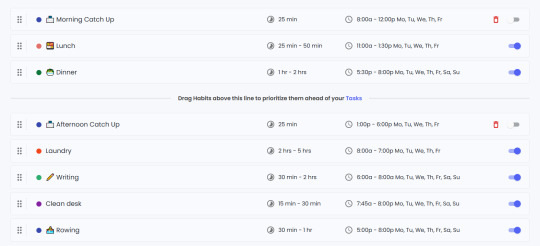
Once you have your schedule set up, Reclaim will keep it up-to-date, shifting sessions around if you aren’t able to perform that task when originally assigned, or if someone else schedules over it. There are settings that let you determine how your calendar events looks to other people and if they are able to schedule over it, but outside of work no one is actually looking at my calendar to see if I am busy, alas. You currently have to use slack to control the tasks in the moment, for instance, if you want to mark something as done or won’t do. Again, slack is fine when I’m sitting at my work desk all day, but not it’s not something I use in my “off” time.
Overall, I think Reclaim has a lot of potential, but in it’s current form, it won’t work for me.
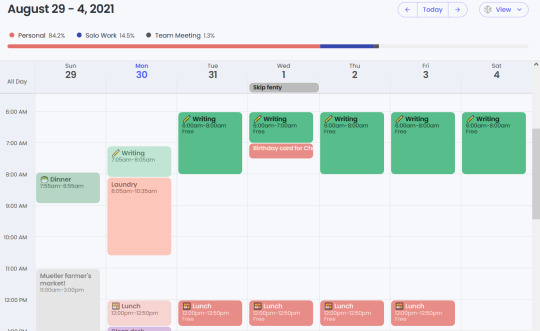
3 notes
·
View notes
Photo

Tweet from @emializh that says “’unlimited PTO’ those are just words man. there’s no way that particular signifier has a referent, no way those words aren’t just trailing in the sky a few hundred feet short of touching the ground. what’s it like to be astral projecting in the realm of forms all the time dude”
1 note
·
View note
Text
A Bounty of Links
��🏽 Cultivating Attention
My Secret Weapon Against the Attention Economy - Elliot Holt
He picks a poem on the first day of every month and reads that poem each day that month.
The Materiality of Digital Culture - L.M. Sacasas
Sacasas interrogates the "myth of digital immateriality." "To forget the body is to forget our dependence, our frailty, our limitations. To forget these aspects of our embodiment is also to forget the value, indeed the necessity, of humility, generosity, care, patience, and mercy."
🌳 Degrowth
A degrowth syllabus
🤦♂️ A new type of guy...
Youtuber tries to squeeze more value out of bookstores - hits all the classic "productivity guy" benchmarks. H/T to unrelatedwaffle
📚 Analog life
This makes me want some wider, matching notebooks - I always ogle consistency
Stuart Lennon's notebook routine
🎲 Complete miscellany
Vegan whole grain pancake mix
8 notes
·
View notes
Link
A thread of people who "get it."
"Grind culture + wellness culture (think: toxic positivity) = optimization culture."
0 notes
Text
ya being kafkaesque isn’t about turning into a bug it’s about how if you turned into a bug your boss would still be like “ok but we’re short staffed can u still come in”
59K notes
·
View notes
Text
Thoughts on Zettlekasten
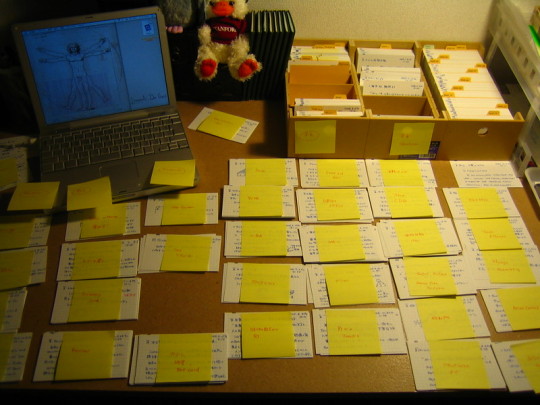
(img by hawkexpress)
Zettlekasten is not new, but it's having a moment, at least among my friends. Someone named Sascha is writing a book on it and offering consulting, and his work has increased the popularity of the system. In short, Zettlekasten is a personal knowledge management system using notecards, created in the late 20th century by the researcher Niklas Luhmann. He wrote notes capturing knowledge onto index cards, then created links between the cards using a numbering system of his devising. Sounds pretty simple, right? It's actually pretty close to the research method I was taught in grade school around the same time that Luhmann was using his system for his work.
Like other productivity methods like the bullet journal, the concept is simple but prescriptive details are added to make it 'a system." The more details, the more you feel like this is a silver bullet. That's why I always find myself drawn to exercise routines that tell me exactly how many reps and sets to do, no matter what my personal situation might be. Like other productivity systems, the prescriptivism supports pollyannaish thinking and is shaded by hustle culture. Nothing is wrong with this system, but when you read the forums on Sascha's site, you see people hitting against the limitations of the system and blaming themselves. A lot of these people's problems would be solved by putting physical pen to physical paper to do a little thinking outside of the system, which, to be fair, Sascha himself does advocate.
Zettlekasten is a specialized use of hypertext, and in the 2000s, we collectively exchanged hypertext for what Mike Caulfield calls "the stream." For worse, in his opinion, and to the benefit of social media conglomerates and capitalists. Whether that is true or not, we did so willingly because of some very real frustrations with hypertext. Those same frustrations apply to zettlekasten and digital gardening. It is hard to communicate and learn through discussion with hypertext (at least, as we have used it). It doesn't reflect change over time. It is often very hard to navigate. Many of the things it does well can be replaced by the better searching algorithms created since hypertext's heyday. If you choose to use zettlekasten, it's worth thinking about how to best mitigate these issues, rather than sweeping them under the rug to sell how-to-zettlekasten books.
3 notes
·
View notes
Text
Accountability in productivity systems
Accountability is a well-recommended part of habit forming. Accountability relies on community even though most productivity systems are all about individual pulling yourself up by your bootstraps.
Maybe being involved more deeply in communities would naturally lead to better habits. If you interact with other people, you want to shower so that you don't repel folks, you want to exercise so that you can keep up with your friends on adventures.
Maybe the personal productivity trend is responding to an ongoing abnegation of responsibility to our communities. We cut out everything that might try to hold us accountable for our behavior, and then add some back in ourselves.
0 notes
Text
A World Without Email - Cal Newport
I have many, many thoughts on it, but for right now, I’ll just say that I do NOT recommend Cal Newport’s new book. I have gotten a lot out of some of Newport’s previous work, such a Deep Work, even when I had disagreements with it. Not so with this one.
A World Without Email tries to revive Taylorism while also ignoring the fact that knowledge workers have switched to completely remote work and many if not most will likely remain that way.
0 notes
Text
“Procrastination is an emotion regulation problem, not a time management problem.”
“Why you procrastinate (it has nothing to do with self-control”
Why You Procrastinate (It Has Nothing to Do With Self-Control)
Charlotte Lieberman at the New York Times:
Procrastination isn’t a unique character flaw or a mysterious curse on your ability to manage time, but a way of coping with challenging emotions and negative moods induced by certain tasks — boredom, anxiety, insecurity, frustration, resentment, self-doubt and beyond.
Procrastination is an…
View On WordPress
15 notes
·
View notes
Link
unrelatedwaffle, on how she prevents becoming overwhelmed by too many hobbies. I am not sure the randomness would work for me, but I find the concept intriguing.
1 note
·
View note
Link
Continuing my research on digital garden by exploring the work of Maggie Appleton. She has some beautiful explainers, including a history of digital gardening.
She identifies what I think of as a key aspect of digital gardening, a prioritization of “topography over timeline.” As she describes it, “digital gardening is the Domestic Cozy response to the professional personal blog; it's both intimate and public, weird and welcoming. It's less performative than a blog, but more intentional and thoughtful than a Twitter feed. It wants to build personal knowledge over time, rather than engage in banter and quippy conversations."
8 notes
·
View notes
Text
Tacit knowledge and Naturalistic Decision-making
I have been reading about Naturalistic Decision-making and tacit knowledge. My introduce was this series of posts by Cedric Chin.
Tacit knowledge is knowledge that can't be put into words. Apparently there is some disagreement that this exists, although it seems straightforward to me. I see its evidence in these videos:
🤬فقط في مصر 🤬 pic.twitter.com/omo4Im5hwU
This is relevant to the labor movement because capitalists tend to think that with enough documentation, workers can be replaceable widgets. I mean, all you have to do is swing the hammer, right? Tacit knowledge explains how there can be a huge difference between workers of different seniority given the same set of "inputs" in the form of training or documentation.
This article describes tacit knowledge as an important factor in knowledge work too. Programmers refer to "code smell"--when you can tell that something is "off" in a bit of code without being necessarily conscious of why. Some of this is experience over time. My pattern recognition tells me this code "looks" more like code that has not worked over the years than code that has worked, so I suspect something is wrong. I am not sure I would consider that necessarily tacit though. I believe the things we are looking for could be taught as principles, such as the Zen of Python. Chin argues that this would still not count as tacit knowledge, however, because having senior programmers pass on these principles "would not lead me to the same ability that they had."
Let's look at writing--how much of literary skill is tacit? One could argue that literary criticism is the attempt to make tacit decisions verbal. I think Chin would think that is a perfect example. While critics may be able to describe what writers are doing after the fact, after a few hundred years of studying novels, we still can't codify "how to write a novel". Yet many great novels have been written. For someone wanting to write a novel today, the best course of action would not be to try to learn it solely by studying but to proceed with the assumption that there are things you will only learn in the attempt. Could you learn all the skills needed to write a novel from reading a text on how to do so? Chin says, “The consensus answer seems to be "yes, in principle it is possible to do so. In practice it is very difficult.” My take on this is that it is so difficult that we shouldn’t even bother; assuming that you are reading this because you want to get good in your career, you should give up on turning tacit knowledge into explicit knowledge and just go after tacit knowledge itself."
The solution to learning tacit knowledge that he eventually describes involves watching people perform the task, so it is better suited to some areas, like tennis, than others, like novel writing. Although... Lydia Davis does a pretty good job talking through her editing process in Essays: One.
0 notes
Text
SRS for thoughts
This week a friend directed me to the work of Andy Matuschak. Matuschak is an independent researcher studying learning in knowledge work, and has many interesting ideas crammed into his papers and website. He and Michael Nielsen's work on flashcard crafting is alone worth a look if you are interested in these topics.
One concept that Matuschak is researching is the idea of SRS for thoughts. SRS--a spaced-repetition system--involves using flashcards that are algorithmically spaced for review to best enable long-term memorization. Usually flashcards are used to learn facts. What is the capital of Ethiopia? Who played James Bond in Octopussy? How do you say "cucumber" in Japanese? Piotr Wozniak, creator of the SRS tool Supermemo, advocates for a much deeper use of SRS to break down texts into discrete elements and review those elements as flashcards to gain a better understanding of the text. Matuschak, and others that he links to, are taking that a step further. What if instead of using SRS to gain a deeper understanding of third-party works, you use it to think more deeply on your own work? You can create flashcards to review your previous notes so that they are not lost in the ether of memory. As the creator of one implementation describes it, "Have you ever had a physical notebook, a text file on your computer, or a blog in which you write your thoughts, but where you never look back on what you wrote? Where after you write your thoughts, the next day you just keep on writing more unrelated thoughts without building on the previous days' thoughts? Spaced inbox helps you with that problem by periodically showing you old notes you've written, gently reminding you to build on your previous thoughts."
My friend unrelatedwaffle has been experimenting with using Supermemo as a reminder system for a non-urgent to-do list. Instead of just sending an article she wants to read to Instapaper or Pocket and forgetting about it forever, she can put a nudge into Supermemo and have it come up occasionally. It is a gentle notice from her past self that she intended to do this.
This article describes another implementation using readwise.io.
I mostly take notes on pen and paper. The analog version is having a schedule on which you index your notebook. Indexing your notebook requires reading through the entire thing. Things that generate more thought lead to writing in the newest notebook, which then gets reviewed when it's time to index. I have switched to using shorter notebooks which allows earlier review.
0 notes